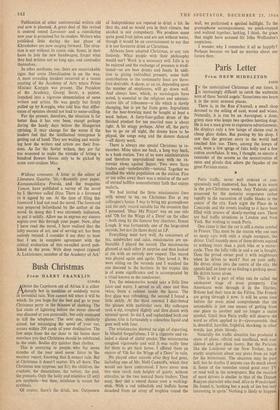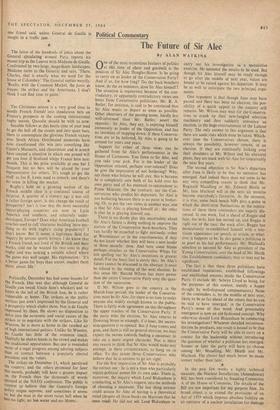Paris Letter
From DREW MIDDLETON
PARIS
N the materialised Christmas of our times, it Ifs
increasingly difficult to catch the authentic note of these 'herald angels.' Sometimes one hears it in the most unusual places.
There is, in the Rue d'Auteuil, a small shop devoted to the selling of coal, wood and wines. Naturally, it is run by an Auvergnat, a dour, grimy man who keeps two spotless hunting dogs. He is not a man given to expensive advertisement. He displays only a few lumps of choice coal in cheap glass dishes. But passing by his shop. I saw that the greatest story in the world had touched him too. There, among the lumps of coal, were a few sprigs of fake holly and a few cotton snowflakes. It was, I thought, as sincere a reminder of the season as the monstrosities of neon and plastic that adorn the façades of the great Parisian stores.
* Paris traffic, never well ordered or con- spicuously well mannered, has been at its worst in the pre-Christmas weeks. Any Yuletide spirit possessed by the motorist evaporates rather rapidly in the succession of traffic blocks in the centre of the city. Each night the Place de la Concorde and the streets leading to it have been filled with masses of slowly-moving cars. There are bad traffic situations in London and New York. But nothing to touch Paris.
One cause is that the car is still a status symbol in France. This must be the reason why one sees so many cars with only a single occupant, the driver. Until recently most of these drivers aspired to nothing more than a push bike or a motor- cycle. Then the lolly rolls in and a car is bought. Does the proud owner pool it with neighbours when he drives to work? Not on your nelly. He drives alone into the centre of the city. He spends half an hour or so finding a parking space. He drives home alone.
This is all a part of what can be called the adolescent stage of mass prosperity. The Americans went through it in the Thirties. Britons had their turn in the Fifties. The French are going through it now. It will be some time before the mass mind comprehends that the automobile is just one means of getting from one place to another and no longer a status symbol. Until then Paris traffic will deserve the word so often applied to it—epolivaninbie, that is, dreadful, horrible, frightful, shocking; in other words, just plain bloody.
Naturally the traffic situation, has produced a spate of plans, official and unofficial, well con- sidered and just plain loony. But the Parisian, like the Londoner or the New Yorker, has a sturdy scepticism about any plans from on high for his betterment. The situation may be pure hell, but he doubts if anyone can do much about it. Some of the remedies sound great over TV or read well in the newspapers. But the reaction of most drivers is similar to that of the Damon Runyon character who read Alice in Wonderland. He found it, 'nothing but a pack of lies but very interesting in spots.' Nothing is likely to happen, one friend said, unless General de Gaulle is caught in a. traffic jam.
*
The latest of the hundreds of jokes about the General circulating around Paris reports his recent trip to the Louvre with Madame de Gaulle. Confronted by two large, magnificent landscapes, Madame turns to the General and says, 'There, Charles, that is exactly what we need for the house at Colombey.' The General replies wearily, 'Really, with the Common Market, the force de frappe, the strikes and the Americans, I don't think I can find time to paint.'
The Christmas season is a very good time to needle French friends' into injudicious bets on France's prospects in the coming international rugby season. Quoodle should be with us now.
Sensible fellows at this hectic time of year tend to get the hell off the streets and into quiet bars, there to contemplate the glorious French victory over South Africa. Overheated memories have now transformed this win into something like Custer's Massacre, and chauvinism and le scotch have created a situation in which one pound will get you four if Scotland whips France here next month. This is the price available at one bar I frequent but no bets will be placed by your representative for otherS. 'It's tough to get the stuff' as Joe E. Lewis used to remark, and there's no sense in killing the market.
Rugby's hold on a growing section of the French middle class is a continual source of surprise. A quarter of a century ago it was still a rather foreign sport. Is this change the result of prosperity? Isn't it true that the most successful soccer-playing countries are now in Latin America and southern, and relatively under-
. developed, Europe? Does what American football coaches used to call 'character building' have any- thing to do with rugby's rising popularity? I don't know. But it seems a legitimate field for inquiry by serious sports writers. I do know that a French friend, not fond of the British and their works, told me he wanted his two sons to play rugby and was seeking a suitable school where the game was well taught. His explanation: 'It's • a better game for boys than soccer, teaches them I more about life.' *
Politically, December has had some lessons for the French. One was that although General de Gaulle can tweak Uncle Sam's whiskeri and tie knots in the tail of the British lion, he is rather vulnerable at home. The strikers in the public services just aren't impressed by the General and a . prosperity which eludes them. Nor is-de Gaulle Impressed by them. He shows no disposition to delve into the economic and social causes of the strikes or to negotiate with the strikers. Like Sir Winston, he is more at home in the rarefied air of high international politics. Unlike Sir Winston, de Gaulle has little of the common touch. Dutifully he shakes hands in the crowd and makes the traditional appearances. But one is reminded more of a regal progress among adoring subjects than of contact between a popularly elected President and the voters.
The strikes on December 11, which paralysed the country, and the others promised for later this month, probably will have a greater impact on the French than the thousands of words spouted at the NATO conference. The public is content to believe that the General's foreign Policy reigns supreme, and sometimes it seems to, but the man in the street raises hell when he has no light, no hot water and no Metro.-





























 Previous page
Previous page